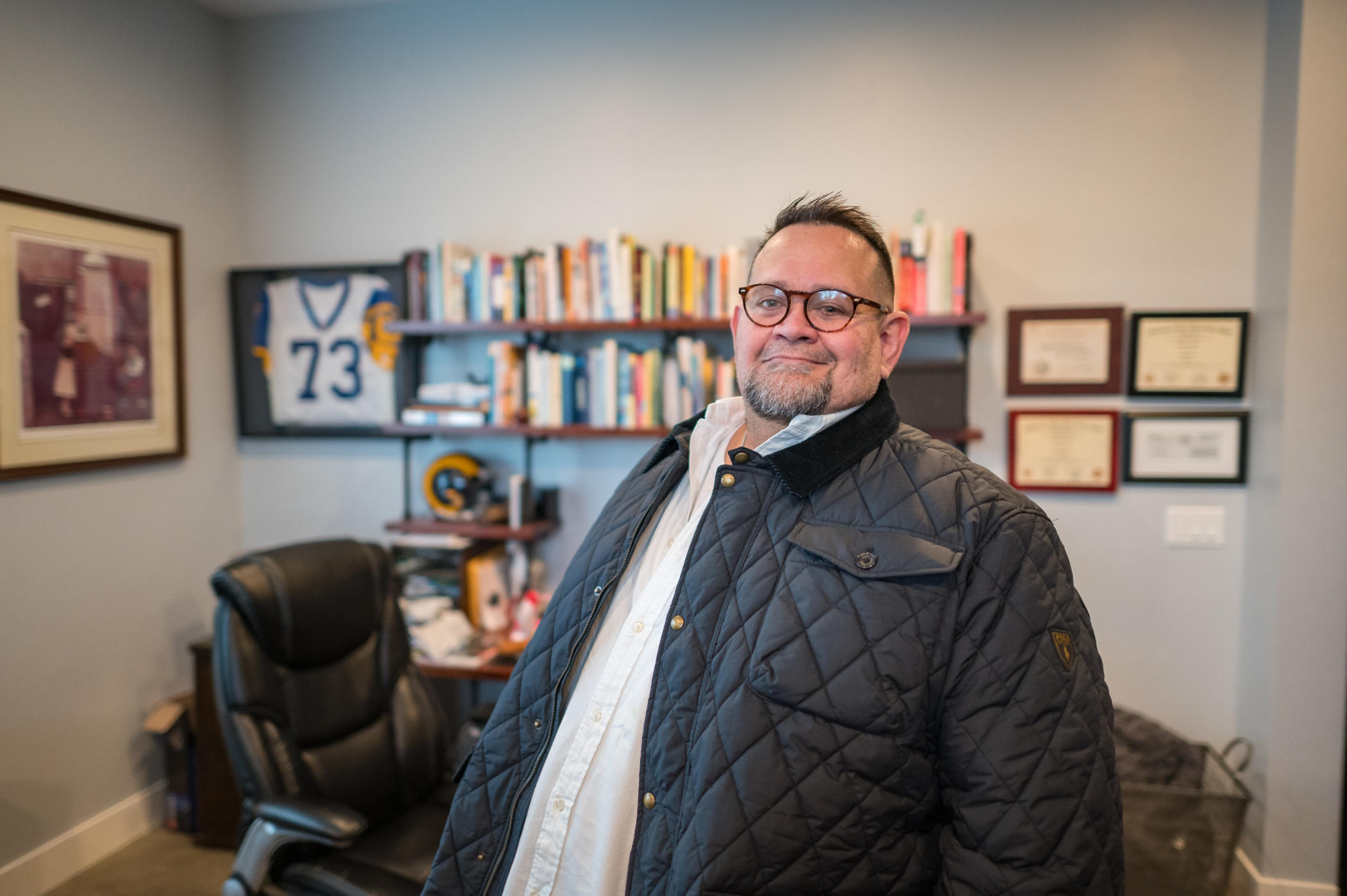5 Questions with Alum and Marriage and Family Therapist Chris Park

Alumni William “Chris” Park is in his 16th year as a practicing marriage and family therapist specializing in relationship issues and family conflict from his Chico office on Thursday, December 8, 2022 in Chico, Calif. But Park’s path to having his own practice contained some twists and turns along the way. First, he was diagnosed with depression and anxiety in his early 30s. He then chose to return to Chico State for his graduate degree in psychology despite some trepidation about being the “old guy” in the program. Park says those experiences benefit him in his practice, providing connections that help his clients feel understood. (Jason Halley/University Photographer/Chico State)
As a young boy, Chris Park was introduced to the world of psychology from his living room couch where he watched the “The Bob Newhart Show.” Park was captivated by the way Newhart, who played a psychologist, helped shepherd his various clients through their trials and tribulations.
“I just kept thinking, ‘what a cool job. People talk to you all day long and you get to help them,’” he said. After taking two psychology classes at Chico State, Park (Psychology, ’94; MS, Psychology, ’04) was all in. And Park’s Chico State connection has only grown. Three of his four children attended Chico State.
He’s now in his 16th year as a practicing marriage and family therapist specializing in relationship issues and family conflict from his Chico office. But Park’s path to having his own practice contained some twists and turns along the way. First, he was diagnosed with depression and anxiety in his early 30s. He then chose to return to Chico State for his graduate degree in psychology despite some trepidation about being the “old guy” in the program. Park says those experiences benefit him in his practice, providing connections that help his clients feel understood.
What are some of the specific struggles that you’re seeing in your clients post-COVID that you weren’t necessarily seeing as much of previously?
Depression and anxiety. The uptick in anxiety actually started following the 2016 presidential election. It really affected a lot of people. People came to me and said, “This stuff is not supposed to happen. How did this happen?” So, it shook everybody’s foundation a little bit and I started seeing an uptick in anxiety. Then there were the fires and the Oroville spillway breaking. With all of that, we’re also seeing a lot of people with complex PTSD. So, once they got better from the fire for instance, then COVID happened and those issues resurfaced. So, a lot of anxiety, a lot of depression, and PTSD.
What do you think you bring to clients that tends to benefit them?
Well, I have a personal history with depression and anxiety. I wasn’t diagnosed until I was out of college. I was in my 30s when I got diagnosed. Everything just kind of made sense after that: the things I did, the things I said, and how I felt. So, I think I kind of have this inside perspective. Describing depression to someone who has never had it, I heard it said one time, is like describing what chocolate tastes like to someone who’s never tried it. It’s so difficult and so individual, and so unique for each person, but it can be helpful to really have an understanding when somebody says to you, “I just can’t get out of bed. My limbs work. I just can’t do it.” And some people don’t understand that. So, them knowing that I understand them, I think helps a lot.
Is there a specific population you tend to work with in your practice?
No. Pretty much all. I have a private practice and I see pretty much anybody. Couples as well. And then we have what’s called an IOP program, Intensive Outpatient. Those are people coming in right out of the hospital and they generally get referred here. It’s three nights a week for three hours, each session, and we just try to get them reacclimated to home life again and learn some skills that will help them with their depression, anxiety, substance abuse, or whatever it is they’re struggling with.
Going back to your undergraduate experience at Chico State, what are your memories?
It was fun. This is a great town to come of age in. The town was affordable. I think the most I ever paid for rent was $200. I worked at Woodstock’s the whole time I was here, and with that, I was able to pay rent and tuition. The friends and the people you meet, you’re in that same stage of life and learning. You’re learning how to pay bills. How to be responsible. Your sexuality starts to express itself because you’re away from the folks. It was just an interesting time. It was a fantastic time. I don’t think I could have gotten that experience anywhere else in my life. I feel fortunate that I landed in the spot that I did. It was just tremendous. The friends you make, the stuff you go through. The emotions are really intimate. The friendships are just so intimate. It was just wonderful.
What about your grad school experience? What was different and what are some of your memories?
I was pretty scared actually. I didn’t want to be the old guy. But I was surprised that there were some other older people. There’s been this transition where people are finally discovering, “I don’t have to do this for the rest of my life. I can go back to school and start a new career,” which I think is great. So, there were some older people that were doing the same thing and it made me feel more at ease. And the professors at Chico State are just fantastic in the MFT program. They have such great knowledge and insight. They’re just fantastic.


